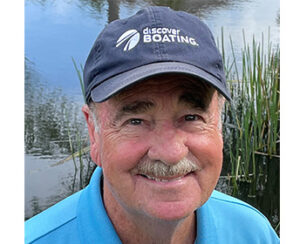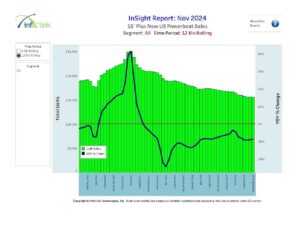
Some 22 million pounds of plastic waste end up in the Great Lakes annually. That number is expected to quadruple by 2050. When China stopped buying our plastic waste two years ago, after decades of recycling it, an unprecedented amount of plastic is now going into landfills, not to mention the waterways we want clean for our boating customers.
Enter both the U.S. Environmental Protection Agency and a University of Michigan student, who are taking vastly different approaches to pollution on the Great Lakes.
EPA administrator Andrew Wheeler recently announced a new program that will award 12 grants aimed at keeping trash out of the Great Lakes, using $2 million in funds from the Great Lakes Restoration Initiative.
“Removing trash, litter and garbage, including plastics, from marine and freshwater environments is one of EPA’s highest priorities,” said Wheeler. “The Trash-Free Great Lakes Program is intended to fund efforts by communities and other applicants to clean up beaches and waterways so that the Great Lakes watershed will continue to provide habitat for wildlife and drinking water and recreations for tens of millions of people.”
The EPA money will be for cleanup projects along the shore or for education and prevention efforts. Requests for these grants will be accepted beginning in October. Applications will be sought from state agencies, local governments, nonprofits, universities and Indian Tribes.
Maybe EPA ought to learn more about the innovative thinking of Jack Riegler, a 19-year-old student at the University of Michigan. Describing himself as a “Great Lakes lover,” Riegler has funded the first company to use 100 percent U.S. plastic waste from the shores of Lake Michigan to produce clothing.
Turning Great Lakes Plastic into clothing
It’s an early June morning and 55 people of all ages hold a cleanup of a two-mile stretch of Pere Marquette Beach in Muskegon, Michigan. They collect nearly 44 pounds of trash, about half of it being plastic that’s destined to be turned into sustainable clothing. Riegler has called his clothing line Oshki, which means “fresh,” in Native American Ojibwe.
Riegler’s ambition is to shift thinking in the fashion industry and preserve his beloved coast. He started his company two years ago as a high school junior after becoming aware of plastic waste, invasive species and other threats to the Great Lakes. He produced four unisex shirt designs.
“I grew up by the shores of Lake Michigan in Muskegon and wanted to do something to help preserve our water,” says Riegler. “The Great Lakes are really special and tremendously important to Michigan and our country. I felt that entrepreneurial itch to do something more, to innovate in a new way.”
So, with $9,000 startup capital from optiMize, a University of Michigan student-led organization that offers workshops, mentorships and funding to students to create self-directed projects that make a positive impact, Oshki was born.
Riegler, who is studying economics at UM, recently launched the 1:1 Tee, named with a specific mission in mind: to prevent the prediction that the seas will have more plastic than fish in the near future. According to a report by the World Economic Forum and the Ellen MacArthur Foundation, the ratio of fish to plastics in the world’s waterways is predicted to be 1:1 by 2050.
Oshki has sold about 350 of the new T-shirts since they became available in early June. “I’m extremely happy,” says Riegler. “I was able to reach this number because I had money on hand to do the upfront inventory.
“Besides the financial resources,” Riegler continued, “optiMize has been really important to move my business forward. Their mentorship is inspiring me along the way. They believed in my vision since the beginning of this process. They really empower you and make you believe, ‘Why not me?’”
Oshki’s is using 100 percent U.S. plastic waste recycled into every garment – the first apparel brand to do so. The company donates 5 percent of all profits to nonprofit groups working to preserve the Great Lakes, already totaling more than $1,200 in donations.
Riegler already is working on the company’s new line of fully recycled clothing, including women’s’ leggings and men shorts.
“We are looking to find customers as passionate about reducing plastic waste and preserving Earth’s waterways as we are, shifting the fashion industry along the way. Together creating a better tomorrow,” Riegler says.










